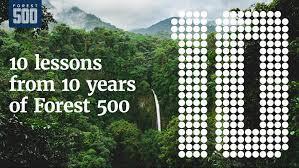
https://forest500.org/analysis/insights/major-companies-and-financial-in...
Global Canopy’s latest Forest 500 report and ranking, which tracks the policies and performance of the 350 most influential companies and 150 financial institutions most exposed to deforestation risk in their supply chains and investments, has been published.
Almost a quarter (23%) of the companies and financial institutions that have featured in each of the 10 annual assessments since the Forest 500 was established have still not published a single commitment on addressing deforestation. These companies include Europe’s biggest shoe manufacturer, Deichmann Group, the second largest Chinese food and beverage company, Bright Food, and one of the world’s largest investment companies, Vanguard.
“There is no solution to climate change without ending deforestation. Almost every country in the world has committed to join in efforts to urgently address and reverse deforestation. Yet, after a decade of being in the spotlight and numerous engagement attempts, it is remarkable that this group of highly-exposed companies has failed to produce a single publicly available deforestation commitment. Ignorance has long since ceased to be a defence.” Niki Mardas, Executive Director of Global Canopy
Companies
Our assessments show that 37% of Forest 500 companies have published a deforestation commitment for at least one commodity but not for all of the commodities they are exposed to and have influence over. This includes brands Aldi, Domino’s, Inditex and Walmart.
Nearly two-thirds (63%) of companies that have set commitments are failing to publish adequate evidence of their implementation, including Adidas, Starbucks and Gap.
Financial Institutions
In 2014, just 11% of financial institutions in the Forest 500 had published a deforestation policy. Ten years later that figure has risen to 45%. But this means that the majority (55%) of financial institutions with the highest exposure to deforestation in their portfolios are still yet to set a single policy. This includes BlackRock, Vanguard and T. Rowe Price.
Eighty-five percent of financial institutions still do not have a publicly available policy for all the four highest risk commodities, which drive two thirds of tropical deforestation.
Associated Human Rights Abuses
Our assessments show that the human rights abuses linked to deforestation are being largely ignored across the board. Just 1% of the companies assessed in 2023 had a publicly available commitment in place for all of the human rights commitments across at least one of the highest risk commodities they’re assessed for. None had this for all commodities. 28 companies that have been continuously assessed since 2014 have scored 0 for human rights in the Forest 500 every year.
The same is true for financial institutions. Australia and New Zealand Banking Group Limited (ANZ) was the only financial institution that required its clients and/or holdings to have a zero tolerance approach for violence and threats against forest, land, and human rights defenders in their supply chains.
10 lessons from 10 years
Over the last 10 years, the Forest 500 project has gathered 1.3 million data points on the 350 companies and 150 financial institutions with the most influence on commodity-driven tropical deforestation. The 10th edition of the Forest 500 reveals ‘10 lessons from 10 years of data’.
Chief among the 10 lessons is the need for regulation as the data shows voluntary action by the private sector is not working. Regulation for companies is now in place in the EU, but other key markets, including the US and the UK need to follow suit. And the laws need to be strengthened to include financial institutions, due to the influence they can exert over companies.
“Voluntary action alone doesn’t cut it; regulation is the only way to make the vital shift to the system as a whole that the world so urgently needs” Forest 500 identifies the 350 companies and 150 financial institutions with the greatest exposure to tropical deforestation risk, and annually assesses them on the strength and implementation of their commitments on deforestation, conversion of natural ecosystems and associated human rights. This means identifying which companies and financial institutions are addressing deforestation and human rights abuses, which aren’t, and what needs to happen to drive forward progress towards commodity supply chains that are free from deforestation. These assessments, which have been running since 2014, hold the Forest 500 ‘powerbrokers’ to account, and provide a comprehensive dataset on their performance which you can view or download.
About
Ranking the most influential companies and financial institutions in the deforestation economy









